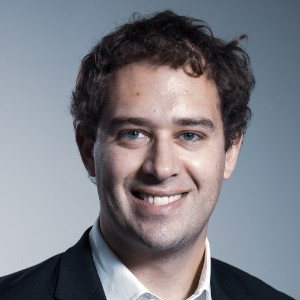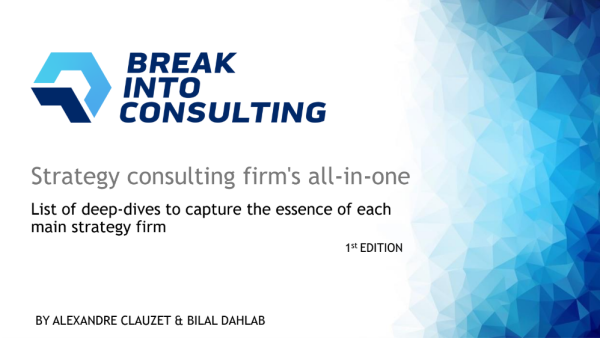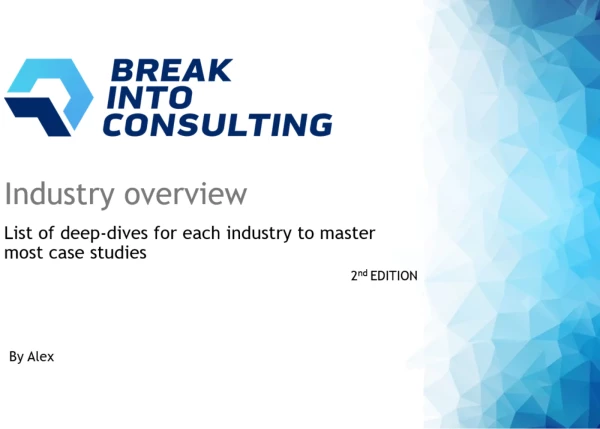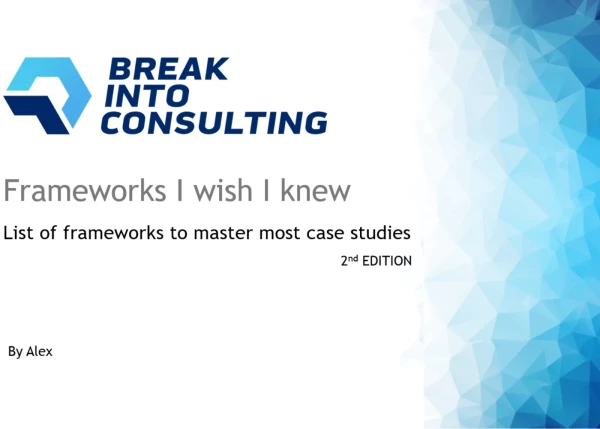I've decided to spend the best part of the next 1-2 months prepping for case interviews (PST, market sizing, and cases). I don't have any experience with cases before and would essentially be starting out fresh. What would be the best way to structure my prep plan to be prepared for MBB interviews in around 2 months time?
Get Active in Our Amazing Community of Over 451,000 Peers!
Starting to prep for consulting interviews (completely new)
Overview of answers
Hi!
Here are my 5 tips:
1) Practice mental calculation daily (percentages, decimal places, large numbers, arithmetic) – even though it's not the most important part of the interview and it's allowed to make mistakes, you need to master your numbers very comfortably. If you don't, during the interview you will start feeling nervous and will perform worse on other things. Here are some good apps for your phone I can recommend: Brain Booster Games and Mental Math Practice
2) Cases, cases, cases – do as many as you can. After you gather a bit of experience of practicing with your fellow students, try to find a person who is now working or has worked in the past at the MBB's recruting and ask them to simulate an interview with you (e.g. coach on preplounge)
3) Prepare and practice personal fit interviews – they are as important as the cases. Write down your stories, practice telling them with your fellow students, or with an expert.
4) Beware of your mental state – try not to stress too much before and during the interview (I know it's easier said than done). Do sports, take care of your health, try yoga, meditation – whatever makes you less stressed. I've seen so many candidates pale as a sheet of paper during my time as an interviewer at McKinsey, all worried and jittery – as you can imagine this doesn't help your performance.
5) If you get rejected, it's not the end of the world, do prepare yourself mentally for this thought! A close friend of mine became depressed for months after being rejected at McKinsey. I think it was because she treated this as a "do or die" situation. Do not do that! There are infinite options of different careers and adventures out there, you don't need to become a strategy consultant to be happy. Just try to embrace this before going into the interview room – and you will be better prepared for both failure and success.
Best,
Daniel
Hi Anonymous,
There is already lots of excellent "content" advice on how to prepare for interviews. Looking at this question more from a "process" point of view and assuming that the candidates starts his prep in due time, this is what worked for most of my coaching candidates:
- Starting off with basic case interview books like Marc Cosentino's "Case in Point" or Victor Cheng's "Case Interview Secrets"
- At the same time watching Victor Cheng's youtube videos
- Getting a professional case interview coaching, like here on PrepLoungequite early in the process, as a professional case interview coach will help you get things right immediately, so that you can focus on your weak spots and at the same time reinforce your positive habits during your further prep
- Start having interactive mock interviews with peers, which you can find in masses also on PrepLounge - there is a strong correlation between number of interactive cases solved and interview success; I occasionally also do professional case interview coachings myself (Case Interview Coaching)
- Once you feel you make progress in your case interview performance, start having some professional coaching sessions again to get some real-life benchmark and feedback for further improvement; what works best is approx. 1 professional coaching per week as there is enough time to improve weak spots with peer mock interviews until the next coaching, and at the same time this timeframe is short enough so that you keep up with you prep and do not lose track
- Once you start feeling comfortable with solving cases in general, focus on being as structured as possible in every sentence you say and every answer you give ("ABS - always be structured"). For this, I wrote a distinct book with the most important frameworks and business concepts for case interviews (you can find it at http://cif.consulting-case-interviews.com/). This book not only gives you a short description and basic idea of the frameworks and concepts, but also a step-by-step guide on how to actually use and implement them (you would be surprised how many candidates don't have a clue about that!).
- As soon as you master the case interview basics, start preparing the behavioural part of the interviews; this is especially important for McKinsey as this is the part where most candidates really fail. Recently I have added a blog with free expert advice on the McKinsey PEI where I am sharing some answers on the most common PEI questions that I receive from candidates (https://pei.consulting-case-interviews.com/blog/); I also wrote a distinct ebook for "The Ultimate McKinsey PEI Prep" (https://pei.consulting-case-interviews.com/).
- If time permits, read some general books about consulting to get a good understanding how the industry works, like "The Firm" by Duff McDonald, "Managing the Professional Service Firm" by David Maister and "The McKinsey Way" by Ethan Rasiel
Hope that helps - if so, please give it a thumbs-up with the green upvote button below!
Robert
Hi,
I recommend the following approach
1) Start with "Case in point" book - you can download this book for free everywhere. It's not the best guide on how you should approach the cases, however, it will give you the basic understanding.
2) Start practicing cases with partners here or find them locally. !!! Find experienced partners or coaches who can provide a good feedback!!!
3) Purchase and read Viktor Cheng Book (Amazon Kindle store) and listen to LOMS (his website). I recommend to reread the book and listen to LOMS every 15 cases. Every time, having more experience, you’ll be finding something new.
4) Practice fast math
- Learn how to multiply double digit numbers (https://www.youtube.com/watch?v=6ndkkPZYJHo)
- Learn the division table up to 1/11 (i.e. 5/6 = 83.3)
- Learn how to work with zeros (Hint: 4000000 = 4*10ˆ6)
- Use math tools (Mimir math for iOS), Math tool on Viktor Cheng website to practice
5) Below you can find a list of the most common case types and some high-level recommendations on structuring:
- Market sizing - structuring from the supply or demand side. Structuring using a formula or using an issue tree
- Profitability - basic profitability framework. Remember about different revenue streams and product mix
- Market context cases (Market Entry, New product, Acquisition, etc). Always start with the big picture "market". Finish with something specific to the case (e.g. How to enter?"). Structure it as if you are defining the work streams for the real project.
- Operational math problem (e.g. Should we increase the speed of an elevator or just buy a second one? How should we reduce the queues? Etc.) - Structuring as a process / value chain, with inflows, operations, and outflows
- Cost cutting - I provided the recommendations on structuring it here: https://www.preplounge.com/en/consulting-forum/operations-cases-mck-1105#a2134
- Valuation - Purely financial structure with cash flows, growth rate, WACC / hurdle rate, etc.
- Synergies - revenue synergies (price, qty, mix) and cost synergies (value chain).
- Social / economics cases (e.g. How to improve the quality of life in the city? How to increase the revenues of the museum?) - huge variability. Practice 3-5 social cases before the interview
6) Also, I would try to focus on the most common industries in the following priority(sorted by probability of getting a case): 1-retail and CPG; 2-airlines; 3-Telecom; 4-banking; 5-natural resources; 6-tech
7) ! Important: don't forget about the FIT interview part. Crafting you stories and backups stories will require a couple of weeks!
PS
Here is a good list of articles regarding the different parts of the case:
1) Start with clarifying questions
https://www.preplounge.com/en/consulting-forum/clarifying-questions-1786#a3956
2) Communicating while structuring. Here is a long post by me on how to communicate the structure during the case study:
3) Using hypothesis. I made a post about hypothesis here:
4) Communicating while making calculations:
- Always tell the interviewer your approach
- Check with the interviewer that your approach is correct
- Come to the interviewer with some preliminary answers
- Check your assumptions with the interviewer
5) Communicating during the analysis of graphs / tables
- Take a minute to look at the graph. Read the graph title. Look at the graph type and define the type (pie chart, line chart, etc). Look at the legend (ask for clarifying questions if necessary). Identify whats going on on the graph. Look for: Trends, % structures. Look for unusual things - correlations, outliers,
- Make 3-4 conclusions from the graph. Think out loud on potential hypothesis on what could be the root cause / what are the consequences
- Prioritize the most important for your current analysis and move forward with the case
6) Communicating while having questions on creativity
- Ask an interview for a minute to think
- Think of several buckets of ideas (e.g. organic growth / non-organic growth / differentiation). Remember to think as big as possible
- Narrow down to each bucket and generate as many ideas as possible
- Present the structure (buckets) and then your ideas
7) Communicating your conclusion. You can find a good example I've posted here:
8) Communicating your FIT stories
Use the top-down approach while communicating your stories. "The Pyramid Principle" is the must-read by ex McKinsey on this topic.
I recommend using the STAR framework:
- In Situation, you should briefly provide the context, usually in 1 or 2 sentences
- Task usually includes 2 or 3 sentences describing the problem and your objective.
- Then you provide a list of specific actions you took to achieve the goal. It should take 1 or 2 sentences per action (Usually 3-4 actions). Note that the interviewer can stop you any minute and ask for more details.
- The results part should have 1 or 2 sentences describing the outcomes. This part is finalizing your story - make sure it can impress the interviewer and stay in the memory.
Best!
Hi there,
I would recommend the following steps to organize your preparation:
- Identify the companies interesting for you. Many people are interested mainly in MBB, you can start defining the exact list of companies interesting for you for the internship
- Define a calendar for your preparation. Check if there is any deadline for the internship applications. Then identify how many hours you have before that and allocate a time slot for preparation in your calendar for each day, working on the points below. Many people need 100+ hours to be ready before the interview so you can keep that as a benchmark
- Read Case In Point or Case Interview Secrets for a general understanding of what a consulting interview is. Don’t focus on the structures proposed in the books though, as they are not good enough nowadays.
- Start reading good MBA Consulting Handbooks – you can find several for free online (Insead is a good one to start). Read the cases and try to apply your structure to solve them. Whenever you see there is something missing, upgrade your structure with the new insides. PrepLounge also has a Case Library that you can use. Try to read at least a new case per day – in this way you will absorb better the information with constant learning.
- After the first 5-10 cases in books/handbooks and basic theory, start to practice live. PrepLounge can be helpful to connect with other candidates for that. There is a relevant part of the interview score that is based on your communication, which you cannot practice at all if you read cases only. Keep track of your mistakes and see if you repeat them. If so, try to identify the source of the mistake (feedback of experienced partners would be particularly useful for this). Be sure to focus on both the behavioural part and the case part. The case part should also cover market sizing, mental math and graph analysis.
- Before your application, be sure to review your CV and Cover, so that they are in the required format for a consulting application
- At least three weeks before the application deadline, start networking to find referrals for your target companies. You can find some tips on how to do that here: https://www.preplounge.com/en/consulting-forum/hey-everyonehope-all-is-well-3176
- Once you feel you are not improving anymore, if you have a tight time constraint or if you want a realistic assessment of your level, consider using support from experts to strengthen your performance
- Before the interview, be sure to prepare your questions for the interviewer –great way to show you prepared in advance and to connect with the interviewer for a good final impression.
Best,
Francesco
Hello!
Agree with all the methodologies proposed, but first ask yourself the question, is it worth it at this point? What are your chances of getting an interview atm?
I would first clarify this, before investing all the time and money.
Hope it helps!
Cheers,
Clara
Hi,
Practically I would suggest the following plan to prepare for your interview:
1. Practice mental math 5-10 minutes everyday (There is a lot of online tool that can help you do that
2. Practice cases as much as you can, I would suggest a minimal of 5 cases a week and practice with different people (i.e. have a couple of partners that you will practice on different days every week)
3. Prepare your fit interview questions. I would suggest pick 3-4 strong story from your experiences that you can spin to answer multiple questions. That way you can have deeper understanding of these stories
Hope this helps :)
Hi,
there are 4 aspects of the application process you have to focus on:
- CV and cover letter: prepare impactful documents that highlight your achievements, skills, and motivation.
- Test: you should understand if your office assesses candidates with PST, SHL or Imbellus, since every McK office can use one of these 3 standards.
- Personal Experience Interview: fit and CV questions to assess your personal impact, leadership skills, and entrepreneurial spirit. You should prepare impactful stories about your experiences that cover these 3 main pillars.
- Case Interview: typical business case to evaluate your structure in approaching problems, problem-solving skills, and business sense. This is the most time-demanding aspect to work on. I recommend reading Cosentino's Case in point to fix the theory. Then, what will be really important is practicing mock cases with other candidates here on Preplounge.
Hope it helps,
Antonello
Hi,
Following are some tips for your preparation
PEI - many candidates ignore PEI but all successful ones will tell you how crucial it is
- Go through your entire CV and pick relevant examples you can leverage
- Come up with 6-8 stories that answer some of the most common questions around Personal Impact, Entreptreneurship and Leadership
- Practice these to be 4-6 mins long with sufficient detail and engaging. Ensure you can be flexible to answer 2-3 questions with one story as you do not know which questions you will get
- Apply a framework such as SCR to your answers so you know you are structured in your communication
Case
- Read guides to casing such as case in point. Yes this is not enough but they are a great foundation for you to get started and build your knowledge
- Once you are ready to practice cases, do maybe 1 or 2 on your own without looking to see how you did and set a benchmark. Maybe watch videos of others casing and use that as a guide
- Then always practice with others - find people also preparing and sit down with them to practice. Nothing beats face to face (or video call) prep
- Find a coach you like to help you get to the next level so that you go from being a strong to a very strong candidate
Other tips to get better as you practice
- Whenever you can try and see what the market for a particular product is (for example what is the market size for an air fryer or what are the revenue streams for a hospital?). The more you think about business problems and solve them the better you will get
- Read up on the biggest industries - especially finance, healthcare/Pharma ,tech and Oil & Gas. The economist/WSJ/FT/Bloomberg are all good sources. Read up also on how the industries work using guides you can easily find online
- Practice mental math so you are confident in your execution abilities
All the best!
Udayan
Hello,
In order to prepare for case interview, I suggest the following approach:
- Read the Case in Point (Cosentino) in order to get a first approach with the Case interviews
- When you have read most of it, start doing cases on yourself practicing with frameworks, math and structure of the interview.
- Practice with other people (candidates/coaches)
- Read some chapters of the Case Interview Secrets
- Listen to the recordings of the LOMS program
While you are practicing for your cases, you have to consider also some time to prepare your CV/Cover Letter and the Fit Interview that is a fundamental part of the interview.
Consider that you will need around 1.5/2 months to prepare and at least 40/50 cases.
Feel free to contact me if you want to have some help to stucture your workplan.
Best,
Luca








Ciao Daniel, this answer is super-interesting. Would you mind posting links for the apps you suggest? Unfortunately, there are 50+ with similar names on the App Store :)